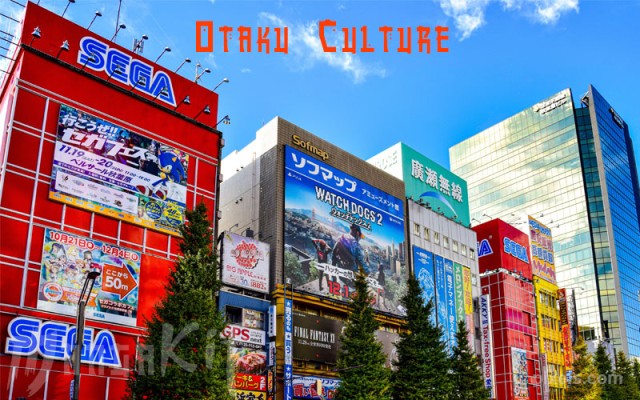The Otaku Culture: More Than Just a Passion for Manga!
If, until now, the word "Otaku" has merely conjured up images of comic books for some, it's high time to unveil the wealth of experiences that this term actually encompasses! Otaku culture proves to be an immersive experience that far transcends mere comic book reading. It's not just a passing interest, but rather a full-fledged lifestyle that reaches well beyond Japan's borders. Whether you've merely flipped through a manga in a waiting room or your room resembles an Otaku art exhibit, there is always something new to explore in this vibrant culture. From the catchy tunes of J-Pop to figurines so detailed they could almost be mistaken for real (if they weren't just 8 inches tall), Otaku culture is constantly evolving. So put on your glasses (even if they're lens-free) and dive in with us to uncover what makes Otaku culture so special and addictive.

Introduction
Otaku culture is a multidimensional phenomenon that encompasses far more than just an appreciation for manga. It represents a Japanese subculture that has captivated millions of people worldwide, touching on diverse areas such as anime, video games, music, and even fashion. Over the years, this culture has not only expanded beyond Japan's borders, but it has also gained in influence and popularity, becoming an undeniable force in the global entertainment industry.
The impact of Otaku culture extends beyond niche interests. Once stigmatized and marginalized, even in Japan, it is now increasingly embraced and commercialized globally, even influencing mainstream pop culture. Whether through international conventions, collaborations with renowned brands, or cinematic adaptations, it is clear that Otaku culture has a global impact that cannot be ignored.
This article aims to dive into the vast universe of Otaku culture, going well beyond a mere passion for manga. We will explore its various facets, from its humble origins to its global influence, and shed light on the diverse elements that contribute to its complexity and universal appeal.
1. Origins and History of Otaku Culture
To fully understand the richness of Otaku culture, it's crucial to trace its origins and follow its evolution over time. This section delves into the Japanese roots of this captivating culture, its initial stigmatization and cultural rehabilitation, and its rapid global proliferation.
1.1. Japanese Roots and Rise to Popularity
Originating in Japan in the 1980s, Otaku culture initially focused on the fascination with manga and anime. This emerging subculture quickly captured the attention of young Japanese people, providing a creative outlet for a generation seeking new forms of expression. Subsequently, the rise of the internet and social media significantly contributed to the democratization of this culture, allowing more and more people to connect, exchange, and celebrate their common interests. The establishment of specialized magazines, dedicated stores, and even entire neighborhoods like Akihabara in Tokyo, attests to the magnitude of the Otaku phenomenon within Japanese culture.
1.2. Initial Stigmatization & Cultural Rehabilitation
Despite its growing success, Otaku culture was not always well-received. Initially, it was often associated with negative stereotypes, particularly that of the asocial and obsessive individual. Media-covered incidents even led to broader stigmatization of the Otaku community. However, over time, a cultural transformation took place. The Otaku status became less marginalized, partly aided by media works that explored and demystified the lives and passions of Otakus, as well as by growing commercial and tourist interest in Japanese pop culture.
1.3. Globalization of the Otaku Phenomenon
The reach of Otaku culture is not confined to Japan. Thanks to easier access to information and online content, the phenomenon has rapidly gained international popularity. Dedicated conventions like Comic-Con in the United States or Japan Expo in France attract hundreds of thousands of visitors annually. Translations of manga and anime into multiple languages, along with collaborations with international brands, have also contributed to globalizing this unique culture. Today, Otaku culture is a global force that transcends borders, uniting individuals from diverse backgrounds around a shared passion for Japanese pop culture.
2. Manga as the Gateway
While manga is indeed a significant component of Otaku culture, for many, it primarily serves as a gateway into this fascinating world. This section will discuss the pivotal role of manga in Otaku culture, highlight some genres and titles that have captivated global attention, and explore the significant contributions made by mangakas and artists behind these works.
2.1. The Importance of Manga in Otaku Culture
Manga holds a central position in the Otaku universe. These Japanese comics are often people's first touchpoint with Otaku culture, serving as an introduction to other elements such as anime, video games, and music. Due to their accessibility and the range of genres they cover, manga attract a broad spectrum of readers and often serve as a starting point for a more in-depth exploration of Otaku culture.
2.2. Popular Genres & Titles
The world of manga is incredibly diverse, offering something for almost every taste. From action-oriented shonen titles like Naruto and One Piece to romantic shojo tales like Fruits Basket, all the way to more mature seinen plots like Berserk, the realm of manga is rich in variety. Some titles have even gained such popularity that they have become cultural phenomena in their own right. This diversity of genres and titles greatly contributes to the universal appeal of manga.
2.3. The Role of Mangakas (Manga Authors)
Mangakas, meaning the authors and artists behind these manga, play an essential role in Otaku culture. They are the visionaries who breathe life into fantastical worlds, create memorable characters, and weave captivating narratives. Names like Osamu Tezuka, often referred to as the God of Manga, and contemporary authors like Eiichiro Oda and Hajime Isayama, have left an indelible impact on the culture.
3. The Universe of Anime
After exploring the significance of manga, it's time to venture into the fascinating world of anime. This section will discuss the natural transition from manga to anime, examine some iconic series and their cultural impact, and take a behind-the-scenes look at the process of creating an anime.
3.1. The Transition from Manga to Anime
Anime is often considered the animated version of manga, but it's an art form in its own right with its own nuances and techniques. While many anime are adapted from popular manga, the process is not as straightforward as simply converting static images into motion. Creating an anime requires close collaboration between writers, directors, animators, composers, and many other professionals. Indeed, anime adds a new dimension to the Otaku experience, with elements like the soundtrack, voice acting, and animation uniquely bringing stories to life.
3.2. Iconic Series and Their Cultural Impact
The cultural impact of certain anime series cannot be underestimated. Works like Neon Genesis Evangelion, Sailor Moon, and Dragon Ball have not only captivated Japanese audiences but have also gained global renown. These series have paved the way for broader recognition of Otaku culture and have often been people's first contact with this subculture. For instance, Pokémon has transcended the realm of anime to become a global franchise, touching everything from video games to collectible cards. These iconic series often have an impact far beyond their original domain, influencing fashion, art, and even popular terminology.
3.3. The Process of Creating an Anime
Behind every anime is, of course, a complex and laborious creative process. It generally starts with the development of a script and a storyboard, followed by the design of characters and settings. Then, the actual animation process begins, requiring hours of work for each second of film. Post-production also includes voice acting, creating the soundtrack, and final editing. This process thus involves a multitude of talents, from the director to the animators and composers. Each step is crucial for capturing the essence of the story and creating a work that resonates with fans.
4. Video Games and Otaku Culture
While manga and anime are often the initial touchpoints for engaging with Otaku culture, video games are another essential pillar of this ecosystem. This section will shed light on the significant influence of video games on this culture, highlight some iconic titles that have shaped the industry, and explore the unique synergies between video games, manga, and anime.
4.1. The Influence of Video Games on Otaku Culture
Video games hold a special place in the Otaku world, often occupying the same cultural space as manga and anime. They offer a form of interactive immersion that neither manga nor anime can match. These games allow players to experience the adventures of their favorite characters in a more personal way, thus adding another dimension to Otaku culture. Many video games share themes, aesthetics, and even storylines with popular anime and manga, making them particularly appealing to Otaku fans.
4.2. Popular Titles and Their Impact
Some video games have gained such renown that they have become cultural icons in their own right. Titles like Final Fantasy, Persona, and The Legend of Zelda have not only captivated the Otaku audience but have also managed to reach a global audience. Their popularity has often triggered the creation of merchandise, manga adaptations, and even anime adaptations, thereby showcasing their multidimensional influence.
4.3. Interactions Between Video Games, Manga, and Anime
The Otaku ecosystem is remarkable for its ability to create synergies between different forms of media. For example, many video games are based on popular manga or anime, and vice versa. This symbiotic relationship allows fans to immerse themselves further in the worlds they love, whether it's by playing a video game based on their favorite manga or watching an anime adaptation of their favorite video game. These interactions create a snowball effect, where popularity in one realm can lead to success in another, thereby enriching the overall Otaku experience.
5. Other Aspects of Japanese Pop Culture
We have explored manga, anime, and video games as the main pillars of Otaku culture. However, there are other fascinating elements that enrich this subculture. In this section, we will delve into the role of music in the Otaku universe, the significance of merchandise, and the magic of events such as conventions and festivals.
5.1. Music (J-pop, Vocaloid, etc.)
Music is another area where Japanese pop culture has made a strong mark. Genres like J-pop and phenomena like Vocaloid have captured the imagination of Otaku fans as well as mainstream listeners. J-pop artists like Hikaru Utada or groups like Arashi have had a global impact, while the Vocaloid phenomenon, led by virtual characters like Hatsune Miku, has revolutionized the way we think about music creation and performance. For many, music often serves as the soundtrack to their Otaku experience, whether it's through anime openings or musical themes in video games.
5.2. Merchandise (Figurines, Collectibles)
Merchandise is another vital facet of Otaku culture. From figurines to collectibles like keychains and posters, these items allow fans to materialize their passion. Figurines, in particular, can be true works of art, with a level of detail and realism that appeals to serious collectors.
5.3. Events (Conventions, Festivals)
Nothing captures the essence of Otaku culture quite like live events, such as conventions and festivals. These gatherings provide a platform for the Otaku community to meet, share interests, and discover the latest in manga, anime, and video games. Events like Comiket in Tokyo or various international editions of Anime Expo allow fans to immerse themselves in their passion, often participating in activities like cosplay, expert panels, and exclusive previews.
6. Criticisms and Controversies
While Otaku culture has a broad range of positive contributions to offer, it is not without its criticisms and controversies. This section explores some of the challenges and dilemmas that continue to surround this culture, including persistent stigmatization, concerns related to obsession and escapism, as well as issues of gender representation and social impact.
6.1. Ongoing Stigmatization in Certain Societies
Despite its rise in global popularity, Otaku culture still faces a degree of stigmatization, especially in contexts where it is less understood. In some societies, being an Otaku is often associated with negative stereotypes, such as lacking social skills or a tendency towards isolation. This stigmatization can even manifest institutionally, affecting the social acceptance of fans and their ability to openly share their passions.
6.2. Issues Related to Obsession and Escapism
Another aspect that is often criticized is the level of obsession that some fans can develop for their interests. The danger here is that this passion can tip into a form of escapism, where the fictional universe becomes more important than the real world. This can sometimes have serious consequences, such as academic or professional absenteeism, or challenges related to mental health.
6.3. Impact on Gender Representation and Social Relations
Otaku culture has also been criticized for its often stereotypical representations of gender and social relations. For instance, some manga and anime have been criticized for their sometimes problematic portrayal of women, or for promoting narrow social ideals that may not be healthy or realistic. These criticisms raise important questions about the impact of Otaku culture not only on its followers but also on society at large.
Conclusion
Otaku culture is a complex tapestry that encompasses a multitude of media and activities, from the history of manga and anime to video games, J-pop music, and merchandise. This culture transcends its Japanese roots to become a global phenomenon, influencing various fields such as art, fashion, and entertainment while uniting people from diverse backgrounds. If this exploration has captivated you, consider it an invitation to delve deeper into this rich culture. Whether it's reading your first manga or joining an online community, a world of exciting discoveries awaits you!

 Francais
Francais 


